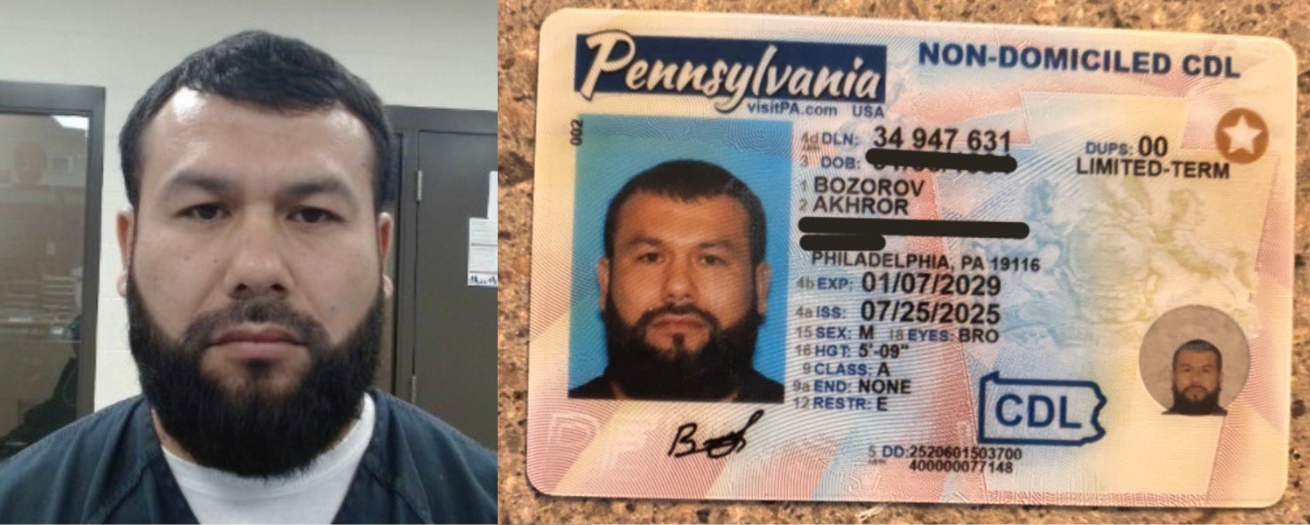HARRISBURG, PA — Republican officials in Pennsylvania are demanding an immediate investigation after federal immigration authorities arrested Akhror Bozorov, an Uzbek national and suspected terrorist, who somehow obtained a Pennsylvania commercial driver’s license and Real ID, despite alleged ties to extremist organizations and prior scrutiny by U.S. law enforcement.
Federal officials say Bozorov entered the United States during the Biden Administration, a period marked by heightened debate over border security and immigration vetting. Law enforcement sources told multiple news outlets that Bozorov, accused of recruiting for terrorist groups and disseminating jihadist propaganda online, managed to cross into the country “undetected by border authorities” last year, raising urgent questions about federal vetting procedures and intelligence sharing at the southern border.
Bozorov’s alleged online activity included explicit calls for jihad and engagement with radical content flagged repeatedly by counterterrorism agencies. Despite these warnings, Bozorov reportedly was able to travel freely, applying for and receiving state credentials in Pennsylvania months before his arrest while operating an eighteen-wheeler in Kansas, ICE officials confirmed to reporters.
At the heart of political accusations is the process by which Pennsylvania authorities issued Bozorov a commercial driver’s license and Real ID, credentials ostensibly backed by rigorous identity checks and federal anti-terrorism measures. Critics argue the lapse reflects “dereliction” in state oversight and undermines the very purpose of the Real ID Act, enacted after 9/11 to prevent individuals with terrorist ties from obtaining secure identification.
“This is not just a policy failure,” said Pennsylvania GOP Chairman Greg Rothman in a press release circulated to multiple newsrooms. “This is a national security breach right here in Pennsylvania. How in the world did someone with terrorist ties pass every check to get behind the wheel of an eighteen-wheeler in our state? And a Real ID at that. The people who signed off on this need to be found, fired, and Governor Shapiro must answer for this.”
Truck drivers are subject to federal background checks and, in theory, Real ID credentials require applicants to provide verifiable immigration documents and undergo enhanced screening. Yet, as highlighted by the PA GOP and echoed in coverage by local and national outlets, state officials appear to have accepted Bozorov’s paperwork and granted him full licensure without triggering any alerts tied to his immigration or terrorism status.
The Pennsylvania Republican Party, joined by several congressional representatives, has called for “a full and immediate investigation” into the circumstances leading up to Bozorov’s licensure. The party’s statement demands that both state and federal oversight agencies “launch a full inquiry into the decision-making process,” with transparency about any policies, bureaucratic failures, or staff responsible for approving the application.
Critics of the Shapiro administration point to recent media investigations into Real ID loopholes and the challenges states face in accessing timely federal background data — an issue aggravated, they say, by staffing shortages and policy shifts in border security enforcement since 2021.
Law enforcement agencies have acknowledged the investigation but declined public comment on specifics, citing the ongoing criminal and national security probe. Members of Governor Josh Shapiro’s office told one Philadelphia outlet that “all proper procedures were followed,” but promised to cooperate fully with any oversight reviews.
National security analysts, quoted in coverage by NBC and regional wire services, warn that Bozorov’s case exposes persistent vulnerabilities in U.S. vetting systems and state government coordination. “If someone flagged by federal agencies for radical activity can slip through every net — from the border, to DMV, to employment as a truck operator — it points to a systemic failure, not just one bad decision,” said one former DHS official interviewed for the story.
Analysts caution that the incident is unlikely to be isolated, citing recent audit findings that Real ID implementation remains uneven and slow across several states. Congressional testimony earlier this year described ongoing gaps in data-sharing and identity verification that could allow terrorist suspects to exploit the system.
As of publication, Bozorov is in federal custody pending deportation proceedings and possible criminal charges related to terrorism. Pennsylvania lawmakers have promised to introduce new oversight measures in the wake of the case, including stricter vetting protocols for commercial license applicants and improved coordination with federal agencies.
The PA GOP statement, sent to local and national media, concludes: “We demand transparency from Josh Shapiro and the Governor’s Office. The public deserves answers about how a suspected foreign terrorist was able to receive the highest level of state licensure and operate unchecked on America’s roads.”
Based in Philadelphia, A. Benjamin Mannes is a consultant and subject matter expert in security and criminal justice reform based on his own experiences on both sides of the criminal justice system. He is a corporate compliance executive who has served as a federal and municipal law enforcement officer, and as the former Director, Office of Investigations with the American Board of Internal Medicine. @PublicSafetySME

